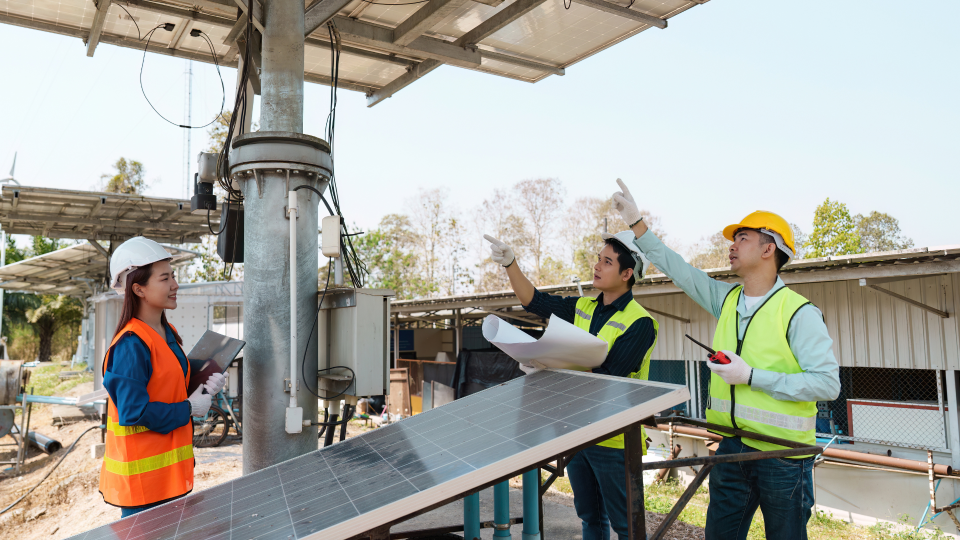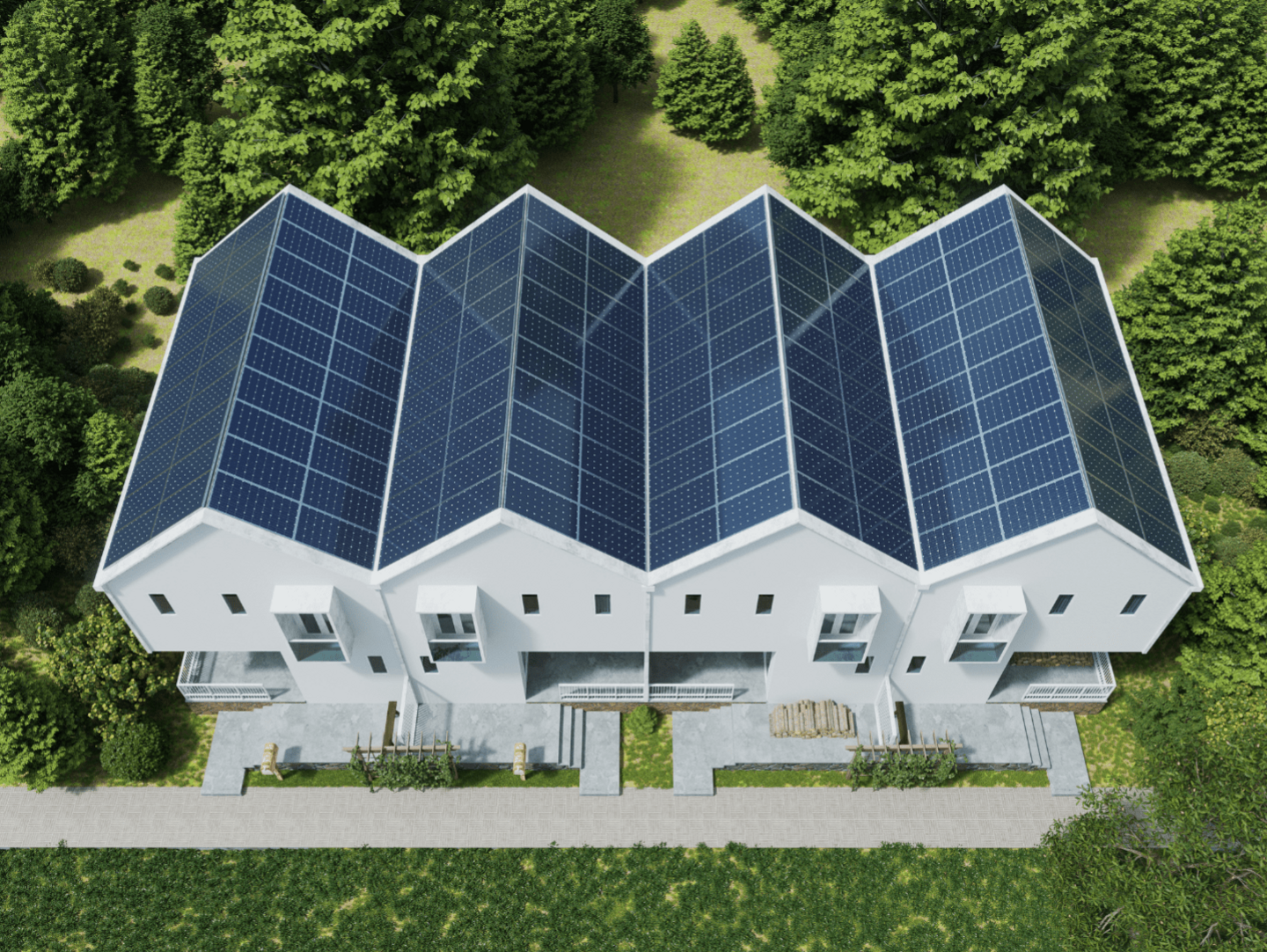A construction site I visited last month looked different from any I'd seen in my years working in construction recruitment. Solar panels were being installed on every new build, materials arrived with detailed carbon footprint labels, and site managers discussed BREEAM ratings as naturally as they once talked about project timelines. It might have felt strange, but it’s not an unusual situation anymore, with changes happening across the UK construction industry.
Green construction is reshaping how we build in Britain. If you're working in construction or considering a career in the sector, this shift is creating new roles, demanding different skills, and opening fresh opportunities. The industry needs people who understand sustainable building practices, and companies are already hiring on this basis.
What is Green Construction?
Back in 2023, we posted about the new Green Construction initiatives taking shape in the UK. 2 years later, we're taking a look at how the changes in the industry are affecting job prospects and opportunities for construction workers at all levels.
Green construction means building in ways that reduce environmental impact from start to finish. Instead of just focusing on speed and cost, it balances these with environmental responsibility throughout a building's entire lifecycle - from design and construction through to daily operation and eventual demolition.
You'll see this in practice through sustainable materials like reclaimed timber or low-carbon concrete. Buildings get designed with better insulation and efficient heating systems that consume less energy. Construction teams plan carefully to reduce waste. Renewable energy sources like solar panels or ground-source heat pumps become standard features rather than optional extras.
Water conservation measures, improved indoor air quality, and designs that maximise natural light all fall under green construction. The approach differs from traditional building because it considers long-term running costs and environmental impact, not just immediate expenses.
Certification schemes like BREEAM (Building Research Establishment Environmental Assessment Method), LEED (Leadership in Energy and Environmental Design), and Passivhaus standards measure how sustainable a building is. Achieving these certifications requires specific construction methods and materials, which directly affects the work tradespeople do on site.
Why Green Construction is Growing
Several forces are pushing the UK construction industry toward sustainable practices, and they're gaining strength rather than fading away.
Government regulation is a primary driver. The UK has committed to reaching net zero carbon emissions by 2050, and buildings account for roughly 25% of the UK's total carbon footprint. Part L of the Building Regulations, which covers energy efficiency, has become progressively stricter. The Future Homes Standard requires new homes built from 2025 onwards to produce 75-80% less carbon emissions than current builds.
The “Green Tax” and higher costs associated with renewable projects has dropped significantly. Energy-efficient buildings cost less to run, which matters as energy prices have risen. Commercial clients want offices with low running costs and good Environmental Performance Certificates (EPCs) because these directly affect their bottom line.
The construction industry is responding with innovation. Manufacturers develop new low-carbon materials. Construction methods evolve to accommodate these changes. Modular construction grows partly because it produces less waste and allows better quality control, which alignins well with sustainability goals.

How This Affects Your Construction Career
These changes create real opportunities for people working in construction or considering entering the industry. New roles are appearing that didn't exist five years ago, and they're becoming core parts of construction teams rather than niche positions.
Sustainability coordinators work on larger projects to meet environmental standards and certification requirements. Green building consultants advise on materials and methods to achieve sustainability goals. Renewable energy installers specialise in fitting solar panels, heat pumps, and other clean energy systems. Building Performance Evaluators assess how completed buildings actually perform compared to their design specifications.
Your existing trade is evolving rather than disappearing. Electricians now work with solar panel installation, battery storage systems, and electric vehicle charging points. Plumbers fit heat pumps, underfloor heating, and rainwater harvesting systems. Joiners work with sustainable timber and newer composite materials. Quantity surveyors calculate costs for sustainable materials and factor in whole-life costing rather than just initial build expenses.
I've seen how these changes affect hiring across construction firms in the region. Companies actively seek candidates who've completed training in sustainable construction methods, even when hiring for standard trades roles.
There’s also the benefit of an often higher salary. Business look to pay a premium for people with future-proof skills. A ground-source heat pump installer can earn considerably more annually than a heating engineer who only works with gas boilers. Site managers with BREEAM assessor qualifications are in high demand and can negotiate better packages.
Career progression looks different because the industry needs these skills now, creating opportunities for people willing to learn. Take a general labourer who gains qualifications in sustainable construction methods and renewable energy systems - they can move into more specialised, better-paid roles faster than through traditional routes.
Skills That Matter in Green Construction
Understanding thermal efficiency, air tightness, and ventilation systems matters across multiple trades. You need to know how different insulation materials perform, why vapour barriers matter, and how to prevent thermal bridges that waste energy. For electrical work, understanding photovoltaic systems, battery storage, and smart building controls is becoming standard rather than specialist knowledge.
Material knowledge has expanded beyond traditional options. Low-carbon concrete, sustainably sourced timber, recycled materials, and newer innovations like hempcrete or sheep's wool insulation all appear on green construction projects. Knowing the properties, installation requirements, and appropriate applications for these materials makes you more valuable to employers.
Energy efficiency concepts that once only concerned building designers now affect trades at every level. How does a building lose heat? What makes a heating system efficient? How do you design ventilation that maintains air quality without wasting energy? Understanding these principles helps you make better decisions during installation and identify problems before they occur.
Several certifications directly boost your employability:
Construction Skills Certification Scheme (CSCS) now offers cards specific to low-carbon construction
City & Guilds provides qualifications in solar panel installation, heat pump installation, and energy efficiency for buildings
BREEAM training courses teach you how sustainability assessments work, valuable for supervisory roles
Energy Institute qualifications in energy management suit more senior positions
Adaptability tops the list of soft skills because construction methods keep changing as new materials and technologies emerge. Someone who resists learning new approaches may struggle to thrive in modern construction. Problem-solving abilities help because green construction often involves working with newer systems where established solutions don't exist yet. Communication skills matter because you'll need to explain to clients why sustainable approaches work differently from what they're used to.
Training opportunities exist at different levels. Further education colleges offer courses in sustainable construction, often available part-time or in evening classes for people already working. Apprenticeships increasingly include green construction elements as standard. Online learning platforms provide flexible options for specific technologies like heat pump systems or solar installation. Professional bodies like the Chartered Institute of Building (CIOB) offer continuing professional development courses focused on sustainability.

Where Green Construction Jobs Are Heading
The trajectory for green construction jobs points firmly upward. The government's commitment to retrofit millions of existing homes to meet energy efficiency standards will create sustained work for decades. Every older building in the UK will eventually need upgrading to meet tighter environmental standards, representing an enormous amount of work for skilled tradespeople.
Retrofit specialists will be in particularly high demand. These professionals understand how to improve existing buildings without compromising their structural integrity or original character – which is especially important for the UK's many period properties. The work differs from new builds because you're working with existing structures, materials, and systems, requiring different expertise.
Career security in green construction looks stronger than in traditional construction. It’s highly likely that environmental regulations will only get stricter, not looser, which means demand for green construction skills will continue growing. The work can't be easily automated or outsourced - someone needs to physically install insulation, fit heat pumps, and make buildings meet sustainability standards. This combination of growing demand and hands-on work creates good long-term career prospects.
The industry will continue changing, which means continuous learning becomes part of the job. New materials will emerge, technologies will improve, and regulations will most likely tighten. Construction workers who accept this ongoing development will find themselves in demand, whilst those who resist change may find opportunities narrowing.
Your Next Steps
Green construction represents genuine opportunity rather than a passing trend. The combination of government regulation, economic benefits, and changing client expectations means sustainable building practices will define UK construction's future.
For construction professionals, developing green construction skills won’t be optional; they’ll become a requirement for career progression and job security. The good news is that opportunities to learn these skills exist at every level, from apprenticeships through to professional qualifications for experienced workers.
If you're considering your next move in construction or looking to develop skills that will keep you employed long-term, focusing on green construction makes practical sense. The roles exist now, the training is available, and the demand is growing.
At Select Recruitment, our construction team works with firms across the region who are hiring for green construction roles and traditional trades positions where sustainability knowledge provides an advantage. If you're ready to explore your construction career options, contact our team of experienced consultants. We have a wide range of construction roles across various specialisms, and we're dedicated to finding the perfect fit for your skills and career goals.
Author:
Kelly Raynsford- Business Manager, Construction




